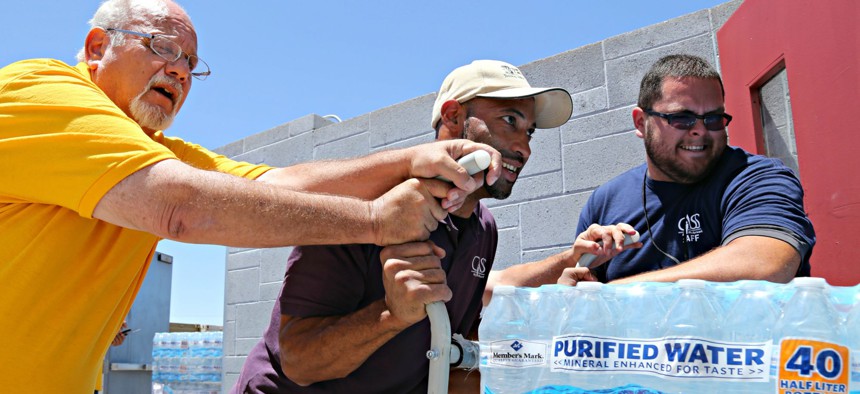Record-Breaking Heat Bakes Arizona; Trump Prompts Mayor to Leave GOP

Leo Block, left, Matari Phason, center, and Brian Juarez, right, push part of a shipment of 20,000 water bottles donated by Yellow Cab of Phoenix to Central Arizona Shelter Services, Arizona's largest homeless shelter. Ryan Van Velzer / AP Photo

Connecting state and local government leaders
Also in our State and Local Weekend Digest: Feds block Idaho dam project; St. Louis police chief vs. homelessness groups; and Utah lawmakers examine alcohol management.
PHOENIX, ARIZONA
EXTREME HEAT | Triple-digit temperatures broke records in Phoenix, Yuma and other locations in Arizona. In the Valley of the Sun, Phoenix Sky Harbor International Airport hit 118 degrees, making it the fifth-hottest temperature ever recorded at the airport. Extreme heat is expected to last through Wednesday, with temperatures anticipated to hit 120 degrees. The all-time heat record in Arizona is 122 degrees, set in June 1990. Phoenix’s city government has warned residents to stay indoors, drink plenty of water and avoid outdoor activities, including hiking on park trails. On Sunday, the Phoenix Department of Parks and Recreation tweeted out this image of a temperature reading from Echo Canyon on Camelback Mountain.

[Arizona Republic; City of Phoenix; @PhoenixParks]
CHARLESTON, WEST VIRGINIA
MAYORS | Donald Trump’s ascension to the top of the Republican Party isn’t setting well the mayor of West Virginia’s capital city. Danny Jones announced Friday that he was changing his part registration from Republican to unaffiliated. “For the first time in my life, I cannot support the Republican nominee for president” and “the obsession of the West Virginia House of Delegates’ leadership with the so-called Religious Freedom Restoration Act.” [Charleston Gazette-Mail]
BOISE, IDAHO
WATER MANAGEMENT | Federal authorities denied a proposal late last week from an irrigation company to build a 109-foot-high dam in southeastern Idaho on the Bear River. Twin Lakes Canal Co. began pursuing a license for the project over a decade ago. The dam would have provided irrigation water to about 230 farmers and ranchers, according to the company. In its decision rejecting the dam, released Thursday, the Federal Energy Regulatory Commission cited the popularity of the area where the dam was to be built among outdoor enthusiasts. The Bear River drains lands in Idaho and Wyoming. Flowing south to Utah and into the Great Salt Lake, it is the biggest stream in the Western Hemisphere that does not empty into an ocean. [Public News Service]
ST. LOUIS, MISSOURI
HOMELESSNESS | St. Louis Police Chief Sam Dotson has been getting a lot of criticism following a crackdown on groups and individuals who hand out food to the city’s homeless. Those groups are doing homeless people a disservice, Dotson said. “The whole idea is to help that population transition back into housing, transition back into jobs, and if we make it too easy — give them food, give them clothes, allow them to live on the street — they never go to those service providers.” [CBS St. Louis]
SPRINGFIELD, ILLINOIS
STATE MUSEUM | Gov. Bruce Rauner closed the Illinois State Museum and its satellite branches nine months ago to supposedly cut costs, but the main location is reopening July 2 with a new $5 entry fee for adults. The state Department of Natural Resources hopes to secure partnerships with local stakeholders to reopen other branches. More than 100 museum employees were supposed to be laid off when the museum closed, but their union challenged the decision in court—stalling any action. “This all could have been avoided,” said state Sen. Andy Manar. “Families have been displaced, jobs have been lost, the integrity of the museum and its accreditation have been put in the crossfire because of Gov. Rauner’s choices.” [Pantagraph]
SALT LAKE CITY, UTAH
LIQUOR | Utah lawmakers want to see the state’s alcohol control program run more like a business, which is why they took a rare tour of a government-owned liquor store. Many Utah residents are teetotaler Mormons, but the number of drinkers is growing and the state wants the revenue. Several legislators were surprised how little the Salt Lake City warehouse employees made given the money it brings in. The Beehive State runs 44 liquor and wine stores grossing about $400 million annually, leaving government reluctant to privatize the industry. [Daily Herald]
NASHVILLE, TENNESSEE
CAMPUS CARRY | Public universities and colleges here are preparing for a new law that will allow staff and faculty to carry concealed handguns on campuses. The law goes into effect July 1. Under it, anyone who wants to carry a handgun on public college or university campus has to first register with the school or local law enforcement. Paperwork and policies related to the law are proving to be a heavy lift for some smaller institutions like community and technical colleges. “Many of our schools do not have the resources,” said Mary Moody, general counsel for the state’s Board of Regents. “They’re going to be taxed to the limit just to monitor all of this.” [The Tennessean]

NEXT STORY: State, local governments get new tech buying option




